| | Mathison Museum of Natural History |  |
|
+15Caracal widukind lucky luke Megaptera rogerpgvg Jill sunny pipsxlch Saarlooswolfhound landrover Kikimalou Taos Duck-Anch-Amun Shanti Saien 19 posters |
|
| Author | Message |
|---|
widukind
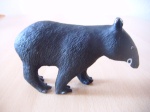
Country/State : Germany
Age : 48
Joined : 2010-12-30
Posts : 45745
 |  Subject: Re: Mathison Museum of Natural History Subject: Re: Mathison Museum of Natural History  Mon Mar 27, 2023 2:51 pm Mon Mar 27, 2023 2:51 pm | |
| |
|
  | |
bmathison1972
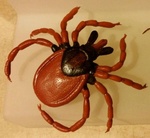
Country/State : Salt Lake City, UT
Age : 52
Joined : 2010-04-13
Posts : 6710
 |  Subject: Re: Mathison Museum of Natural History Subject: Re: Mathison Museum of Natural History  Tue Mar 28, 2023 12:40 pm Tue Mar 28, 2023 12:40 pm | |
| Species: † Monolophosaurus jiangi Zhao & Currie, 1993 About the Figure: Manufacturer: Safari Ltd. Series: Wild Safari Prehistoric World Year of Production: 2014 Size/Scale: Figure length approximately 19.5 cm. Skull approximately 3.0 cm for a scale of 1:27 based on the holotype IVPP 84019. Frequency of species in toy/figure form (at time of posting): Rare Miscellaneous Notes: My figure has lost stability in the ~2 years (or less) since I have acquired it; not sure if this is a common phenomenon with this model or not. About the Animal: Geographic distribution: Middle Jurassic (Callovian) of present-day China Habitat: Coniferous mesic forest, alluvial plains, marshland Diet: Predator on other vertebrate animals, including sauropods IUCN Status (at time of posting): N/A [prehistoric] Miscellaneous Notes: Monolophosaurus jiangi is known from a single, nearly complete specimen. Its generic name translates to 'single-crested lizard' for said single crest that runs about 3/4 of the length of the skull, from the front of the nose to the base of the eye sockets. The function of the crest is not known, but because it contained large air chambers, it may have functioned as a resonating chamber to amplify vocalizations. In life, the crest may have been brightly colored, and with bright colors in combination with vocalizations, may have been used for sexual communication or selection. It has also been suggested that the crest was hollow for nothing more than making the skull lighter, so the animal would have more maneuverability with its head. [You must be registered and logged in to see this image.] |
|
  | |
Caracal
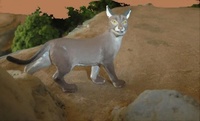
Country/State : France
Age : 65
Joined : 2018-10-24
Posts : 7252
 | |
  | |
widukind

Country/State : Germany
Age : 48
Joined : 2010-12-30
Posts : 45745
 |  Subject: Re: Mathison Museum of Natural History Subject: Re: Mathison Museum of Natural History  Tue Mar 28, 2023 4:02 pm Tue Mar 28, 2023 4:02 pm | |
| |
|
  | |
bmathison1972

Country/State : Salt Lake City, UT
Age : 52
Joined : 2010-04-13
Posts : 6710
 |  Subject: Re: Mathison Museum of Natural History Subject: Re: Mathison Museum of Natural History  Wed Mar 29, 2023 12:44 pm Wed Mar 29, 2023 12:44 pm | |
| Species: Amazona viridigenalis (Cassin, 1853) Common name(s): red-crowned Amazon; red-crowned parrot; green-cheeked Amazon; Mexican red-headed parrot About the Figure: Manufacturer: Safari Ltd. Series: Wings of the World Year of Production: 2005 Size/Scale: Body length approximately 6.5 cm for a scale of 1:4.3-1:5 Frequency of species in toy/figure form (at time of posting): Very rare Miscellaneous Notes: The only other figure of this species I am aware of is by AAA. Safari Ltd. produced a 'green parrot' in their Exotic Birds TOOB, but I don't think it was intended to represent this species. About the Animal: Geographic distribution: Northeastern Mexico and southern Texas (Rio Grande Valley); naturalized in southern California, Florida, Hawaii (Oahu), Puerto Rico Habitat: Open deciduous and mixed woodlands, patchy woodlands, gallery forests, arid lowlands; suburban areas where naturalized Diet: Seeds, fruit, flowers, nectar IUCN Status (at time of posting): Endangered Miscellaneous Notes: Escapees of A. viridigenalis have resulted in established feral breeding populations in southern California (especially the Los Angeles area, including the San Gabriel Valley, and the San Diego area), Florida, Hawaii (Oahu), and Puerto Rico. However, escapees have been documented in other parts of the United States. The Los Angeles area is considered a sanctuary for these parrots, where the population is estimated at 3,000 birds. It has believed there are more birds present in the Los Angeles area than there are in the bird's native range in northeastern Mexico, where it is currently classified by the IUCN as Endangered. [You must be registered and logged in to see this image.] |
|
  | |
widukind

Country/State : Germany
Age : 48
Joined : 2010-12-30
Posts : 45745
 |  Subject: Re: Mathison Museum of Natural History Subject: Re: Mathison Museum of Natural History  Wed Mar 29, 2023 2:14 pm Wed Mar 29, 2023 2:14 pm | |
| |
|
  | |
lucky luke
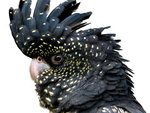
Country/State : FRANCE Saint-Louis
Age : 62
Joined : 2010-07-17
Posts : 6296
 |  Subject: Re: Mathison Museum of Natural History Subject: Re: Mathison Museum of Natural History  Wed Mar 29, 2023 8:20 pm Wed Mar 29, 2023 8:20 pm | |
| |
|
  | |
bmathison1972

Country/State : Salt Lake City, UT
Age : 52
Joined : 2010-04-13
Posts : 6710
 |  Subject: Re: Mathison Museum of Natural History Subject: Re: Mathison Museum of Natural History  Thu Mar 30, 2023 12:42 pm Thu Mar 30, 2023 12:42 pm | |
| Species: Siderone galanthis (Cramer, 1775) Common name(s): scarlet leafwing; red-striped leafwing About the Figure: Manufacturer: Safari Ltd. Series: Authentics Butterflies Year of Production: 1997 Size/Scale: Wingspan 5.5 cm for a scale of 1:1.5-1:2 Frequency of species in toy/figure form (at time of posting): Very rare Miscellaneous Notes: Safari Ltd. would later make this same species for the Butterflies of the World Collectors Case in 2001, although today's Authetics figure has a more accurate shape to its wings. If I remember correctly, the Collectors Case figure was marketed as S. nemesis and from what I can tell, that name is now generally considered a synonym or subspecies of S. galanthis. About the Animal: Geographic distribution: Central and South America, from Mexico to southern Brazil, and the Caribbean Habitat: Tropical and subtropical lowland deciduous and evergreen forests, often in the margins and adjacent open areas Diet: Larvae feed on plants in the family Salicaceae, including Casearia and Zuelania; adults feed on overripe fruit and nutrients derived from moist soil. IUCN Status (at time of posting): Not Evaluated Miscellaneous Notes: While Siderone galanthis has the upperside of its wings brightly colored with contrasting red and black, the underside of its wings resemble dead leaves. This is an example of 'now you see me, now you don't' as a way of confusing would-be predators, such as birds. When seen in flight in bright sunlight, the butterfly would be highly visible to predatory birds, but if pursued the butterfly would immediately land, snapping its wings shut so that only the 'dead-leaf' underside was visible. The bird would still keep searching for a bright red butterfly, but somber underside confuses the bird and keeps the butterfly hidden. [You must be registered and logged in to see this image.] |
|
  | |
widukind

Country/State : Germany
Age : 48
Joined : 2010-12-30
Posts : 45745
 |  Subject: Re: Mathison Museum of Natural History Subject: Re: Mathison Museum of Natural History  Thu Mar 30, 2023 3:23 pm Thu Mar 30, 2023 3:23 pm | |
| |
|
  | |
bmathison1972

Country/State : Salt Lake City, UT
Age : 52
Joined : 2010-04-13
Posts : 6710
 |  Subject: Re: Mathison Museum of Natural History Subject: Re: Mathison Museum of Natural History  Fri Mar 31, 2023 12:45 pm Fri Mar 31, 2023 12:45 pm | |
| Species: Tylobolus utahensis Chamberlin, 1925 About the Figure: Manufacturer: Schleich Series: Death Valley Set Year of Production: 2015 Size/Scale: Body length approximately 6.7 cm, within scale 1:1 Frequency of species in toy/figure form (at time of posting): Unique Miscellaneous Notes: Schleich did not market this figure at the species level and the identification is mine. My rationale is that T. utahensis is a prominent spirbolid millipede that occurs in Death Valley (see also below), and the overall morphology of the figure supports something in Spirobolida. This is the only figure in the Death Valley set I retained, only because millipedes are so very rare as toys and figures (and it's not a band rendition, either!). About the Animal: Geographic distribution: Mohave Desert, USA; from Inyo Co., California to Zion National Park in Utah and northern Arizona Habitat: Deserts, desert washes, rocky foothills Diet: Decaying organic material IUCN Status (at time of posting): Not Evaluated Miscellaneous Notes: Tylobolus utahensis is endemic to the Mohave Desert of the American Southwest. A 2000 publication by North American millipede specialist Rowland Shelley indicates T. utahensis is one of two species of millipedes known to occur in Death Valley (at the time), the other being Piedolus utus. [You must be registered and logged in to see this image.] |
|
  | |
widukind

Country/State : Germany
Age : 48
Joined : 2010-12-30
Posts : 45745
 |  Subject: Re: Mathison Museum of Natural History Subject: Re: Mathison Museum of Natural History  Fri Mar 31, 2023 2:59 pm Fri Mar 31, 2023 2:59 pm | |
| |
|
  | |
bmathison1972

Country/State : Salt Lake City, UT
Age : 52
Joined : 2010-04-13
Posts : 6710
 |  Subject: Re: Mathison Museum of Natural History Subject: Re: Mathison Museum of Natural History  Sat Apr 01, 2023 1:39 pm Sat Apr 01, 2023 1:39 pm | |
| Species: Geochelone platynota (Blyth, 1863) Common name(s): Burmese star tortoise About the Figure: Manufacturer: Yowie Group Series: Wildlife Conservation Series Year of Production: 2018 Size/Scale: Carapace length approximately 4.0 cm for a scale of 1:6.3-1:8 depending on sex (see below) Frequency of species in toy/figure form (at time of posting): Unique Miscellaneous Notes: The scale of this figure would come to 1:6.3 for a large male or 1:8 for a large female. About the Animal: Geographic distribution: Myanmar Habitat: Dry deciduous forest, dry scrubland, scrub bamboo forest, grasslands Diet: Primarily grasses, flowers, fruits, seeds; rarely invertebrates, carrion IUCN Status (at time of posting): Critically Endangered Miscellaneous Notes: The historic range of G. platynota was throughout the Dry Zone of Central Myanmar. Today, it's restricted to wildlife sanctuaries in Central Myanmar. Threats to the tortoise include habitat destruction, capture for the exotic pet trade, and hunting for food by the indigenous Burmese people. Conservation efforts are in place and through captive breeding programs, as of 2017 over 1,000 tortoises have been reintroduced into the wild. [You must be registered and logged in to see this image.] |
|
  | |
rogerpgvg
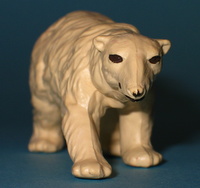
Country/State : UK
Age : 54
Joined : 2016-04-29
Posts : 3894
 |  Subject: Re: Mathison Museum of Natural History Subject: Re: Mathison Museum of Natural History  Sat Apr 01, 2023 7:20 pm Sat Apr 01, 2023 7:20 pm | |
| |
|
  | |
Kikimalou
Admin
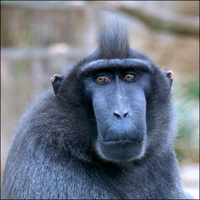
Country/State : Lille, FRANCE
Age : 60
Joined : 2010-04-01
Posts : 21169
 |  Subject: Re: Mathison Museum of Natural History Subject: Re: Mathison Museum of Natural History  Sat Apr 01, 2023 8:23 pm Sat Apr 01, 2023 8:23 pm | |
| Love it  Want one  |
|
  | |
Jill

Country/State : USA
Age : 39
Joined : 2021-04-13
Posts : 2349
 |  Subject: Re: Mathison Museum of Natural History Subject: Re: Mathison Museum of Natural History  Sun Apr 02, 2023 1:14 am Sun Apr 02, 2023 1:14 am | |
| Love this guy, really cool figure, one I spent a little more than usual for my Yowies to secure because I liked him so much.  I feel like it is one of the best Yowies. |
|
  | |
bmathison1972

Country/State : Salt Lake City, UT
Age : 52
Joined : 2010-04-13
Posts : 6710
 |  Subject: Re: Mathison Museum of Natural History Subject: Re: Mathison Museum of Natural History  Sun Apr 02, 2023 1:24 pm Sun Apr 02, 2023 1:24 pm | |
| Species: Megasoma mars (Reiche, 1852) Common name(s): Mars rhino beetle About the Figure: Manufacturer: DeAgostini Series: World Insect Data Book Year of Production: unknown Size/Scale: Body length of male (including cephalic horn) approximately 11.5 cm. Body length of female approximately 7.3 cm. Both figures within scale 1:1 Frequency of species in toy/figure form (at time of posting): Uncommon to rare Miscellaneous Notes: This is second time we've seen M. mars in the Museum. The DeAgostini insects are cast from actual specimens and are therefore all in the 1:1 range. The figures were sold as premiums with books and come in a plastic display box with their Latin and Japanese names. I am not sure what year the figures were released, and it is possible they were released over multiple years. The original set from Japan consisted of 60 species (59 male Scarabaeoidea and one dragonfly), plus four 'secret' figures representing females of select scarab males (as seen today). When the set was released in Italy, three of the standard set were replaced with other species, including a leaf insect. Between the two releases and secrets, I think there are 67 figures total representing 63 species. The figures are secured to the base of the box with a small screw, but can be safely removed if one choses to display them outside of the box. About the Animal: Geographic distribution: South America; primarily the west-central Amazon Basin of Brazil and Colombia, but also Paraguay, Uruguay, and Peru Habitat: Rainforest Diet: Larvae feed on decaying wood and leaves; adults feed on tree sap and overripe fruit IUCN Status (at time of posting): Not Evaluated Miscellaneous Notes: Like many other large dynastine scarab beetles, M. mars exhibits marked sexual dimorphism. Males have diverging horns on a smooth pronotum and an elongated cephalic horn. Females lack horns and have a rugose pronotum; and while females lack horns, they are still large beetles and often rival their male counterparts in mass and weight. [You must be registered and logged in to see this image.] |
|
  | |
widukind

Country/State : Germany
Age : 48
Joined : 2010-12-30
Posts : 45745
 |  Subject: Re: Mathison Museum of Natural History Subject: Re: Mathison Museum of Natural History  Sun Apr 02, 2023 5:41 pm Sun Apr 02, 2023 5:41 pm | |
| |
|
  | |
bmathison1972

Country/State : Salt Lake City, UT
Age : 52
Joined : 2010-04-13
Posts : 6710
 |  Subject: Re: Mathison Museum of Natural History Subject: Re: Mathison Museum of Natural History  Mon Apr 03, 2023 1:26 pm Mon Apr 03, 2023 1:26 pm | |
| Species: Deinacrida sp. Common name(s): giant wētā About the Figure: Manufacturer: Stuart Sales & Services Series: New Zealand Wildlife Collection; NZ Wildlife Figures Pack Years of Production: 2007; 2018 Size/Scale: Body length of larger figure (exclusive of appendages) approximately 5.0 cm for a scale of 2:1-1:2.2 depending on the species; body length of smaller figure (exclusive of appendages) approximately 4.0 cm for a scale of 1.6:1-1:2.3 depending on the species. Both figures fall within 1:1 for several species. Frequency of species in toy/figure form (at time of posting): Very rare Miscellaneous Notes: The larger figure on the left was a stand-alone model that was sold as a part of the New Zealand Wildlife Collection by Stuart Sales & Services (SSS) in 2007 (for years it was misunderstood that these were produced by Science & Nature). The smaller figure on the right was released in 2018 as part of the NZ Wildlife Figures Pack, which contained six tube-sized animals. About the Animal: Geographic distribution: New Zealand Habitat: Variable depending on species, including alpine mountains, rocky bluffs, forests and forest margins, shrubland, grassland; may be terrestrial, semi-arboreal, or boreal Diet: Vegetation; females sometimes feed on dead insects for extra protein during the breeding season IUCN Status (at time of posting): Variable, depending on the species; many species are classified based on the New Zealand Threat Classification System (NZ TCS) rather than the IUCN. Regardless of the system, most species are classified with some degree of endangerment and all but one species are protected by law. Miscellaneous Notes: There are 11 species of giant wētā, distributed on various New Zealand Islands. Those species and their islands include: D. carinata (Herekopare, Kundy, Tihaka, Whenua Hou); D. connectens (South Island); D. elegans (South Island); D. fallai (Poor Knights Islands); D. heteracantha (Little Barrier Island); D. mahoenui (Mahoenui); D. parva (South Island); D. pluvialis (South Island); D. rugosa (Stephens, Maud, Matiu, Mana); D. talpa (South Island); D. tibiospina (South Island). [You must be registered and logged in to see this image.]
Last edited by bmathison1972 on Mon Apr 03, 2023 5:38 pm; edited 1 time in total |
|
  | |
widukind

Country/State : Germany
Age : 48
Joined : 2010-12-30
Posts : 45745
 |  Subject: Re: Mathison Museum of Natural History Subject: Re: Mathison Museum of Natural History  Mon Apr 03, 2023 3:51 pm Mon Apr 03, 2023 3:51 pm | |
| A small but very good brand with very unusual must haves |
|
  | |
lucky luke

Country/State : FRANCE Saint-Louis
Age : 62
Joined : 2010-07-17
Posts : 6296
 |  Subject: Re: Mathison Museum of Natural History Subject: Re: Mathison Museum of Natural History  Mon Apr 03, 2023 4:16 pm Mon Apr 03, 2023 4:16 pm | |
| |
|
  | |
bmathison1972

Country/State : Salt Lake City, UT
Age : 52
Joined : 2010-04-13
Posts : 6710
 |  Subject: Re: Mathison Museum of Natural History Subject: Re: Mathison Museum of Natural History  Tue Apr 04, 2023 1:34 pm Tue Apr 04, 2023 1:34 pm | |
| Species: Aquarius paludum (Fabricius, 1794) Common name(s): water strider About the Figure: Manufacturer: Kitan Club Series: Nature Techni Colour - Water Striders Year of Production: 2010 Size/Scale: Figure 5.0 cm wide. Body length approximately 1.4 cm, within scale 1:1 Frequency of species in toy/figure form (at time of posting): Unique Miscellaneous Notes: This set came with five species of water striders (and three 'mini' Japanese tree frogs). When a surfactant is applied to a small hole in the clear plastic behind the insect, the decrease in surface tension causes the figure to propel forward, as if the bug was actually moving across the surface of the water! The clear acrylic around the insect isn't as opaque in-hand as it appears in this pic; it appears to be a lighting artifact during photography. About the Animal: Geographic distribution: Transcontinental in Eurasia Habitat: Lentic; ponds, lakes, canals, slow-moving stretches of large rivers, rain pools, rice paddies Diet: Insects and spiders that fall and get trapped on the surface of water IUCN Status (at time of posting): Not Evaluated Miscellaneous Notes: Aquarius paludum and other water striders have the ability to 'walk' on water due to a combination of morphologic adaptations. Their main body is lined on the underside with thousands of hydrofuge hairs which prevent the body from getting wet and weighed down with water. Their legs are very long and slender, yet still very strong, and have tiny hydrophobic hairs on the venter. The middle legs are used for rowing while the hind legs are used for steering. [You must be registered and logged in to see this image.]
Last edited by bmathison1972 on Tue Apr 04, 2023 7:59 pm; edited 1 time in total |
|
  | |
Caracal

Country/State : France
Age : 65
Joined : 2018-10-24
Posts : 7252
 | |
  | |
widukind

Country/State : Germany
Age : 48
Joined : 2010-12-30
Posts : 45745
 |  Subject: Re: Mathison Museum of Natural History Subject: Re: Mathison Museum of Natural History  Tue Apr 04, 2023 5:09 pm Tue Apr 04, 2023 5:09 pm | |
| |
|
  | |
bmathison1972

Country/State : Salt Lake City, UT
Age : 52
Joined : 2010-04-13
Posts : 6710
 |  Subject: Re: Mathison Museum of Natural History Subject: Re: Mathison Museum of Natural History  Wed Apr 05, 2023 1:47 pm Wed Apr 05, 2023 1:47 pm | |
| Species: Vanessa atalanta (Linnaeus, 1758) Common name(s): red admiral About the Figure: Manufacturer: Skillcraft Series: Insect Lab Year of Production: 1998 Size/Scale: Wingspan 9.0 cm for a scale of 2:1-1.4:1 Frequency of species in toy/figure form (at time of posting): Rare Miscellaneous Notes: The Skillcraft Insect Lab is a model kit, and the figures must be assembled and painted by the user. These were some of my earliest attempts at painting figures. The main focus of the Insect Lab set was a large anatomical model of a field cricket. However, there were five individual insects (including today's) that were marketed at the species level; the other four species in the set are currently unique. Today's red admiral has an otherwise great sculpt but suffers from a common affliction on toys and figures of having too many legs for a nymphalid (six, should be four). About the Animal: Geographic distribution: Holarctic; adventive in Bermuda, Hawaii, the Azores, and Canary Islands Habitat: Woodlands, forest margins, marshes, moist fields, suburban parks and gardens Diet: Larvae feed on a variety of plants; common host plants include Urtica (nettles), Parietaria (pellitory), Boehmeria (false nettle), and Humulus (hops). Adults feed on fermenting fruit, bird droppings, tree sap, and nectar from a variety of flowers, especially of AsteraceaeIUCN Status (at time of posting): Least Concern (in North America its NatureServe rank is Secure) Miscellaneous Notes: Males of V. atalanta are highly territorial. Territories are oval to ellipsoidal and on average 2.4-7.3 meters long by 4.0-12.8 meters wide. Males will patrol their territory up to about 30 times an hour. If an intruder male enters the territory, the resident attempts to drive him away by disorienting and tiring him out through a series of aerial maneuvers. [You must be registered and logged in to see this image.] |
|
  | |
widukind

Country/State : Germany
Age : 48
Joined : 2010-12-30
Posts : 45745
 |  Subject: Re: Mathison Museum of Natural History Subject: Re: Mathison Museum of Natural History  Wed Apr 05, 2023 3:34 pm Wed Apr 05, 2023 3:34 pm | |
| |
|
  | |
Sponsored content
 |  Subject: Re: Mathison Museum of Natural History Subject: Re: Mathison Museum of Natural History  | |
| |
|
  | |
| | Mathison Museum of Natural History |  |
|
